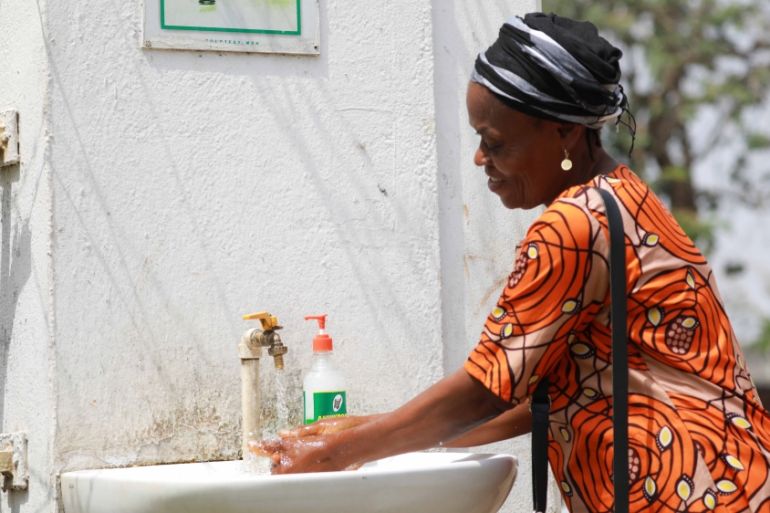Imagine COVID-19 in a world with water and sanitation for all
What would the pandemic’s impact be on a world where every person has access to clean water and soap?

The year is 2020 and a virus of unknown origin is racing across the globe. It started in Wuhan, China, but because of air travel, many cities around the world are starting to be infected almost simultaneously.
Now, imagine that the world being struck by this virus has already met Sustainable Development Goal 6 on ensuring availability of water and sanitation for all, without discrimination on any grounds. Washing hands frequently with both water and soap, a necessity that was previously inaccessible to 40 percent of the world population, is a simple daily routine for all, rather than a privilege and luxury for some.
Keep reading
list of 4 itemsMexico’s teachers seek relief from pandemic-era spike in school robberies
‘A bad chapter’: Tracing the origins of Ecuador’s rise in gang violence
Why is the US economy so resilient?
In this imaginary world, how does COVID evolve and what is its impact?
More than a billion people who live in slums and informal settlements now have a reliable and constant water supply, permanent hand-washing facilities, and adequate toilets. Nobody is forced to queue at a communal water pump to get water for the family, nor to use a public toilet shared by many families.
Imagine that the world’s population has such great sewer sanitation plants, that governments use the research from these sites to trace and identify COVID-19 hotspots, including the presence of any variants, so that they are able to act quickly. People are better able to limit their contact with others and decrease their exposure to the virus.
The 1.8 billion people that previously used or worked in healthcare facilities without basic water services now have access to water and soap on a regular basis. Because frequent and correct hand hygiene is one of the most important measures to prevent COVID-19 infections, the number of infections is down. At the same time, one in five respiratory infections are prevented, diarrhoea episodes are down by nearly half, and doctors are better able to fight antimicrobial resistance. The virus, hence, puts less pressure on healthcare systems, leading to fewer disruptions in preventive, routine and non-emergency medical care.
All workplaces and all workers, particularly migrant and informal workers who comprise 60 percent of the world’s workforce and cannot afford to be out of work during a pandemic, are able to comply with the hand-washing precautions mandated by health authorities, thereby reducing their exposure to the virus and lowering the risk of contagion. The world isn’t hit with 255 million job losses in 2020 alone, putting less strain on public and private budgets.
All schools – including the 43 percent that previously had no facilities for hand-washing with soap – now have access, which directly and positively affects the health of children, as well as teachers and other school staff. Fewer children are missing classes, more teachers are healthy and able to do their jobs, and schools can operate more effectively.
The knock-on effects of access to water and sanitation in schools and the workplace lead to an increase in 1.5 percent of global GDP and a $4.3 return for every dollar invested, due to reduced healthcare costs, better education, and greater productivity. In this imaginary world, water, sanitation and hygiene not only help governments slow the spread of COVID-19, but also limit the economic fallout.
Overall, sanitation and hygiene for everyone decreased the risk of contracting COVID-19 by 36 percent, saving an estimated 2.5 to 6.7 million lives as the race for a vaccine takes shape.
But this is not the world we live in. This is all a fantasy.
We live in a world where more than two billion people have no access to water, more than four billion have no access to sanitation and more than three billion have no access to hand-washing with water and soap. In the least developed countries, nearly 75 percent of people have no access to these basic needs. Those who are most at risk of getting very sick from COVID-19 are largely the same people who lack secure jobs, housing, land, education, access to healthcare and water, sanitation and hygiene.
The story of COVID-19 is filled with failures to prevent the ongoing spread of this deadly virus. As we try to end this pandemic and build forward more effectively, governments at national, regional and global levels must prioritise running water, soap and toilets for all so that all people, everywhere, can realise these basic human rights.
We don’t have to imagine this other world. It’s within our reach.
The views expressed in this article are the authors’ own and do not necessarily reflect Al Jazeera’s editorial stance.